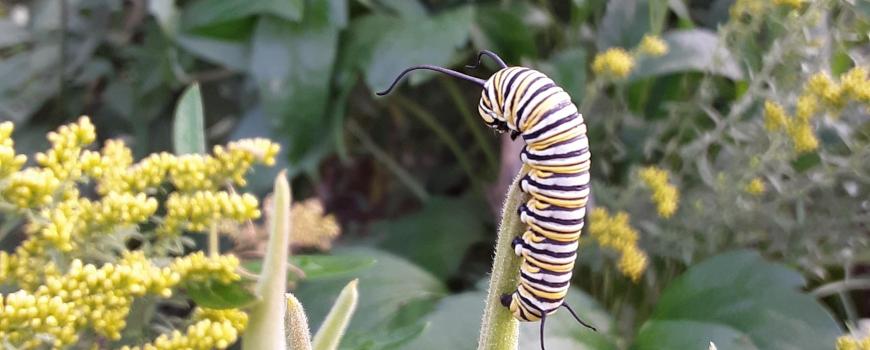March 20 - Third Sunday in Lent
The Bergamo Center for Lifelong Learning in Dayton has transitioned their landscaping to rely primarily on native plants that benefit wildlife. The fruits of their efforts can be seen in this image of a monarch butterfly caterpillar on milkweed. Learn more about their ministry here.
“But now ask the beasts to teach you, and the birds of the air to tell you;
Or the reptiles on earth to instruct you, and the fish of the sea to inform you.
Which of all these does not know that the hand of God has done this?”
- Job 12:7-10
Our Lenten journey through the Laudato Si Action Platform (www.laudatosiactionplatform.org) continues as we strive to contemplate our role in caring for all of God’s creation. From now through Easter, a different Platform goal will be highlighted each week. Let’s continue our journey this week through the desert.
Goal: Ecological Education
Ecological Education is about re-thinking and re-designing curricular and institutional reform in the spirit of integral ecology in order to foster ecological awareness and transformative action. Actions could include ensuring equitable access to education for all and promoting human rights, fostering Laudato Si’ themes within the community, encouraging ecological leadership (students, teachers), and ecological restoration activities.
Reflection
Today’s Gospel tells us the parable of the fig tree that does not produce fruit. It consumes resources from the soil without giving back. The landowner wants to pull it out, but the gardener understands that the tree needs the proper care to thrive and bear fruit. Ecological education invites all of us to better understand the complex and intricate connections between humans and all of creation. Like the gardener from the parable, we all must try to understand the needs of everything and everyone to steward God’s creation well. True understanding of these needs reveal just how interconnected everything and everyone is. Once we begin to recognize this, we are obligated to share this with others. Whether we work in formal education, volunteer our time in advocacy efforts, or share our recognition of integral ecology with our friends and neighbors, we all can teach others the proper way to care for God’s creation, like the gardener in the parable. Do you recognize your connection to the people or the nature around you? Do you take time to notice how plants and animals need each other to thrive? Are you telling others about this? What education do you need to better cultivate the parts of creation entrusted to your care? How can you teach what you know to someone else this Lent and beyond?
Challenge
Learn something new about your connection with God’s creation. Some ideas include understanding where your food comes from, learning about the reestablishment of native prairies, or selecting native plants for your springtime landscaping projects. And don’t keep it to yourself; share that knowledge with someone else through conversation, social media, or an organization you are involved with. Point out the native plants in your garden or the energy-savings improvements you’ve made to visitors to your home, and help them understand why that matters. Invite others to do the same.
Prayer
Oh how beautiful are your ways, O God, the works of your creation.
Raise our consciousness to know and feel deeply in our hearts our connectedness to all that is.
Instill in us the gift of being co-creators and sustainers of life.
Teach us new and unsuspected ways of living so that current and future generations can walk humbly in beauty,
love all compassionately, and live justly in solidarity with all creation.
Loving and gracious God, give us the courage to seek this transformation of self and society and the strength to see it through.
Amen
- School Sisters of Notre Dame Green Team
Going Further
If you're interested in learning about how to transform your own yard or garden into habitat that benefits all creation, sign up to receive monthly updates from MEEC here. We're offering a free, three-part online series in May with all you need to know about gardening with native plants and why that's important for Creation.




